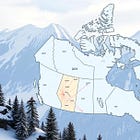Why Do We Blame Ottawa for Provincial Failures?
Many Canadians blame the federal government for issues under provincial control. Understanding our confederation is key to fixing this democratic disconnect.
Learning to Ask the Right Questions

In the heat of political frustration, blame becomes an easy release. In recent years, Canadian voters, particularly on the conservative side, have directed that blame overwhelmingly toward the federal government. It’s easy to focus on Ottawa. The Prime Minister holds the most visible title in the country. National headlines often feature federal controversies, and social media amplifies outrage toward whoever occupies the nation’s highest seat. However, this fixation has created a dangerous political misalignment. We are shouting in the wrong direction.
When healthcare systems crumble, housing prices spiral, or nurses strike, many assume these are failures of federal leadership. When crime rises or education falters, fingers often point to the federal government. Yet these issues lie squarely in the hands of provincial legislatures. Many Canadians, frustrated and misinformed, have forgotten how their own country is structured. What we’re witnessing is not simply misplaced blame. It’s civic illiteracy with political consequences.
A Confederation Forgotten
Canada is not a unitary state; it is a confederation. That means more power at the provincial level of government with a relatively weaker federal government. This wasn’t an accidental design; it was deliberate. When the British North America Act of 1867 (now the Constitution Act) was written, it laid out specific responsibilities for each level of government.
The federal government handles immigration policy, national defence, criminal law, trade, currency, and interprovincial infrastructure. It also collects income tax and distributes funds through mechanisms like equalization payments and Canada Health Transfers.
Provinces, meanwhile, have jurisdiction over healthcare, education, policing (except for the RCMP), property and civil rights, and natural resources. These are not vague suggestions; they are legally binding responsibilities enshrined in the Constitution. Unfortunately, in public discourse, these distinctions have blurred into political abstraction.
Ontario Reelected Ford. Then Blamed Trudeau.
Nowhere is this dissonance more apparent than in Ontario. Premier Doug Ford, the head of a provincial government that controls healthcare, housing policy, and education, was elected in 2018 and reelected, most recently in February 2025. Still, many Ontarians expressed or continue to express fierce anger at Justin Trudeau over unaffordable housing, overflowing hospitals, reduced social services, and underpaid teachers.
This contradiction isn't unique to Ontario. It plays out across the country. In Alberta, Premier Danielle Smith faces a healthcare scandal involving political interference in Alberta Health Services. Nonetheless, the outrage, especially online, is still disproportionately aimed at Trudeau.
This isn't just unfair, it’s politically dangerous. When voters hold the wrong leaders accountable, meaningful change becomes impossible. It rewards provincial negligence and undermines the entire structure of Canadian federalism.
The Media’s Role: A Nationalized Narrative
Part of the confusion lies in media consumption. National news outlets dominate the airwaves and headlines, while local and provincial stories are confined to brief segments or buried behind paywalls. Social media compounds this by algorithmically rewarding polarizing, simplified narratives.
Moreover, Canadian media is increasingly consolidated under private ownership, much of it influenced by U.S. culture and political framing. Outlets like Postmedia, which owns more than 100 publications across Canada, have significant editorial leanings. Add to this the prevalence of American political content online, and many Canadians end up absorbing a worldview where federal leadership is the default villain, even when provincial policies are to blame.
The Pandemic: A Case Study in Misplaced Blame
During the COVID-19 pandemic, the confusion around jurisdiction became especially visible. The so-called “Freedom Convoy” in Ottawa in early 2022 aimed much of its rage at the federal government. Protesters denounced Trudeau for vaccine mandates and public health restrictions, even though the vast majority of these policies were implemented by provinces.
Healthcare systems are entirely run by provincial governments. The federal government provided funding, guidelines, and vaccines, but decisions about lockdowns, school closures, mask mandates, and hospital capacity were made by premiers and provincial health officers.
This disconnect reveals a deeper issue: many Canadians don’t understand how their country works. Moreover, without a shared civic vocabulary, democratic accountability collapses.
Civic Illiteracy Starts in School and It Persists
Most Canadian students receive only a cursory education in civics. By the time they graduate, many can explain the structure of the American government more clearly than their own. The Canadian parliamentary system, federalism, and jurisdictional responsibilities are rarely reinforced.
This educational gap has consequences. Adults who never learned the structure of government become voters who don’t know who to hold accountable. That misunderstanding is then exploited by populists, by media personalities, and by provincial leaders who deflect responsibility upward.
Tribalism Over Truth
What fills the void left by civic illiteracy? Tribalism.
Political discourse has become increasingly hostile. Criticize a policy, and you’re branded a traitor. Raise a nuanced point, and you’re accused of taking sides. Leaders now campaign by attacking their opponents, not by explaining their platforms. Public trust erodes when people feel they’re being lied to, and politicians have stopped treating voters as capable of understanding nuance.
There is blame to go around. The federal Liberals have enacted flawed firearms legislation and failed to include nuclear power in their green bond policy. Some New Democrats (NDP) have supported police crackdowns on Indigenous protests. That being said, the mirror needs to be turned back toward the provinces.
Doug Ford capped nurses’ salaries in Ontario. Danielle Smith has failed to raise Alberta’s minimum wage while launching culture-war attacks on trans youth. Provincial governments receive healthcare funding but hoard it, underspending while blaming Ottawa for system breakdowns.
Understanding the Intersections
To be clear, federal and provincial responsibilities are not always isolated. Immigration is federally controlled, but provinces request quotas based on economic needs. Criminal law is federal, but enforcement is local. Healthcare funding is federal, but hospitals and staffing are managed provincially.
These overlaps require cooperation and compromise. But they do not erase the primary responsibility of each level of government. If a province receives federal funding for healthcare and then fails to spend it appropriately, that is not Ottawa’s fault. That is a provincial failure, political, fiscal, and moral.
Reclaiming Accountability: A Way Forward
We cannot fix what we do not understand. The first step toward reclaiming Canadian democracy is civic education: not just for students, but for voters, for media professionals, and politicians themselves. We must insist on political campaigns that explain platforms, not just attack opponents.
Journalists must redouble their focus on local governance. Voters must learn to hold their provincial and municipal leaders to account. That means asking questions, challenging deflections, and remembering that the most powerful person over your hospital, school board, and rent policy likely works at Queen’s Park, not on Parliament Hill.
It also means demanding better from every political party. Every leader who misleads the public about jurisdictional responsibility should be called out. Every voter who wants change must first ask the right questions about where power lies.
If you found this useful, please consider sharing it with a friend. Civic literacy is contagious. Subscribe to support more content like this, or buy me a coffee to help keep this project going. Every voice counts, especially yours.







Absolutely correct on this issue and recommended solution. Smith is taking full advantage of this lack of civics understanding. Ignorance is absolutely dangerous. I can hear the wailing "nobody told me ..." as provincial healthcare tanks as it's privatized by Smith or Ford or Moe; as religious charter schools take-over public schools with your tax dollars; as provincial pension funds are invested in declining industries like O&G; as home energy costs sky-rocket ...etc.
It's rather curious how some premiers crave power without responsibility.
So, we need to take advantage of social/digital media and educate the masses.
I don’t have much faith in the masses demanding better of themselves. And we’re so far down the path of division that reintroducing civics to education will be perceived as “indoctrination” by the federal Liberals. I can almost write the script for the backlash.